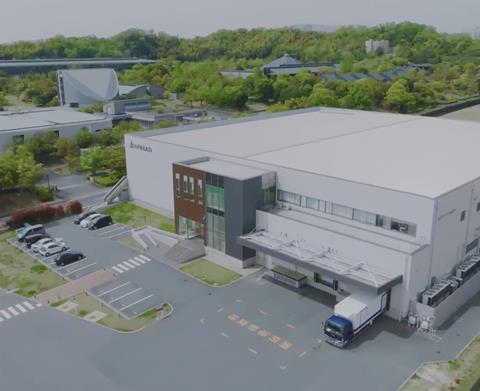Japanese vertical farming specialist inks US$4.6m loan with Shiga Bank featuring sustainability performance targets
Spread has signed a US$4.6m (¥,600m) sustainability-linked loan with Shiga Bank to help fuel future growth, and improve productivity and energy consumption.

According to Spread, this is the first loan of its kind to be signed by a vertical farming company in Japan. It defines Sustainability Performance Targets (SPT) based on the company’s business strategy, and links lending conditions such as interest rate to the achievement of these targets, thus working as an incentive for strengthening Spread’s commitment towards ESG (Environmental, Social, and Governance) management.
Spread has set two SPT for this loan: Improving labour productivity at its vertical farms by 30 per cent (in comparison with FY 2018) and maintaining energy consumption per production volume at the level of FY 2021. These will be measured at Spread’s Kameoka Plant and Techno Farm Keihanna.
Masaki Kushiro, Spread’s general manager of corporate planning department, said taking out a sustainability-linked loan aligned with one of the company’s core values of creating a sustainable society where future generations can attain peace of mind.
“In anticipation of the further growth, following the equity financing last summer, we expect this sustainability-linked loan to be a big step in promotion of expansion and effective use of indirect financing,” said Kushiro.
“As a vertical farming company, we are expected to keep contributing to the environmental and social issues. By announcing some of the tasks that we are working on and linking them to economic conditions, the loan allows us to express our intention to achieve corporate growth and social contribution in parallel.”
The loan was confirmed to comply with the sustainability-linked loan principles outlined by the Loan Market Association (LMA) in a third-party opinion provided by Rating and Investment Information (R&I), one of the major credit rating agencies in Japan.
In the opinion, R&I said Spread’s vertical farming strives to provide solutions to some of the various issues that agriculture faces in the modern world, including the decline in agricultural workers due to an aging population and lack of successors, climate change, environmental pollution caused by the pesticides and fertilisers, food security problems due to international conflict etc.
R&I also identified some of the challenges faced by vertical farms, such as high operational costs and stressed the importance of maintaining high level of production while reducing costs.
In this context, both of the SPT set by Spread were deemed as suitable for a sustainability-linked loan, especially considering that Spread’s current metrics are already in line with or better than the industry standard on both issues.



